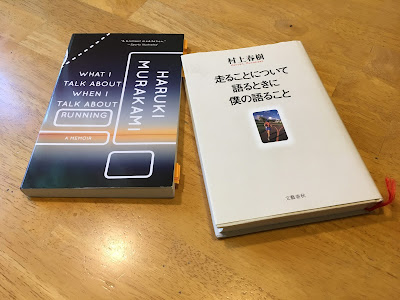Marathon Man-How one breaks the writing streotype
Left: The one I had obtained on Amazon Right: The Japanese first edition my mother had when she lived in Japan
We all
view writers as artists who write their showpiece by sitting at their desk for
hours. Haruki Murakami, who has written famous works such as Norwegian Wood and
1Q84 breaks this stereotype. In fact, this middle-aged writer is able to
concentrate and write his stories by logging miles and miles on the road every
day. Since he had started running to lose weight and to stop smoking, he has
never stopped. While Haruki Murakami is a gifted writer, running had modeled
his mind to become clearer, making him a finer writer.
Murakami
had a struggle before and when he had decided to become a professional writer:
how to keep physically fit. Before he became a full time writer, he owned and
ran a bar. And when he wrote part time, he "smoked a lot, about 60
cigarettes a day, in order to be able to concentrate better." (Spiegel
Interview, 2008, p.1) For Murakami, "running the bar required hard
physical labor everyday"(Murakami, 2007, p.33) which could keep his weight
down. But, when he started sitting down at his desk all day to write, he
started gaining pounds. If he "wanted to have a long life as a
novelist"(Murakami, 2007, p.33) he needed to find an activity that helped him
lose weight. Running was perfect for Haruki Murakami; "As long as you have
a pair of good running shoes and a good road to run to your heart's content.
"(Murakami, 2007, p.33) Murakami had also disliked team sports and in
running, the only opponent is yourself.
Murakami has ran from Athens to Marathon in one take
After becoming a writer and runner, Haruki Murakami's life got simpler and healthier. When he had his bar open, he "often didn't get to sleep until nearly dawn"(Murakami, 2007, p.36) Since he closed the club, Murakami made "a major directional change," from a more "open life to a more closed life."(Murakami, 2007, p.36) Murakami's new, and simpler life had begun: waking up before 5 am, and going to bed before 10. He was more of a "morning person"(Murakami, 2007, p.37), and that was when he could focus in order to finish up important work. After this, he would do other errands that didn't take much concentration. Because of this lifestyle, Murakami has been able to work "efficiently for these past 24 years." (Murakami, 2007, p.37) As Murakami continued to run, he was gradually able to increase his distance. He gradually incorporated running into his daily routine along with sleeping, housework, work, and his three meals a day. The more he ran, the more physical potential he revealed. Along with this lifestyle, his diet had begun to change as well. He began to eat more vegetables with fish as his main source of protein. He wasn't fond of meat anyway, and "this aversion became more pronounced."(Murakami 2007, p.41) The main lesson for Murakami becoming healthy is that: "Life can be tough, but as long as you don't stint on the effort, your metabolism will greatly improve with these habits, and you'll end up much healthier, not to mention stronger."(Murakami 2007, p.42)
Murakami here seen running at Tufts University
According to Murakami, writers who lead a more unhealthy life burn out quickly. The stronger his muscles got, the clearer his mind became. Working artistically is unhealthy, and artists should be leading a healthy life to make up for it. Finding and writing a story is a "dangerous thing for an author;running helps me avert that danger."(Spiegel Interview 2008, p.2)” He uses the term Literary Burnout, in which exhaustion takes over a writer at a certain age. This is the reason why Murakami believes that writing is an unhealthy job. Although they might have written powerful works when they were young, their creative energy declines when they reach a certain point. This results from their physical energy not being powerful enough to overcome the toxin they are dealing with. Murakami believes that "when a writer develops a story, he is confronted with a poison that is inside of him. If you don’t have that poison, your story will be boring and uninspired."(Spiegel Interview 2008, p.2) He himself can feel the poison in his mind, but is able to prevent a high dose of it at his age, because he has a strong and healthy body. The physical liveliness of one that was able to overcome this toxin has passed its peak, and the effectiveness of ones immune system has gradually worn off when unhealthy. When this happens, the "balance between imaginative power and the physical abilities that sustain"(Murakami 2007, p.98) has crumbled. But someday you will lose. Over time, your body will deteriorate at some point. But in Murakami's mind, he would like to postpone that for as long as he can, the point where his "vitality is defeated and surpassed by the toxin."(Murakami 2007, p.99) This is why Murakami, at this age, keeps on running.
After becoming a writer and runner, Haruki Murakami's life got simpler and healthier. When he had his bar open, he "often didn't get to sleep until nearly dawn"(Murakami, 2007, p.36) Since he closed the club, Murakami made "a major directional change," from a more "open life to a more closed life."(Murakami, 2007, p.36) Murakami's new, and simpler life had begun: waking up before 5 am, and going to bed before 10. He was more of a "morning person"(Murakami, 2007, p.37), and that was when he could focus in order to finish up important work. After this, he would do other errands that didn't take much concentration. Because of this lifestyle, Murakami has been able to work "efficiently for these past 24 years." (Murakami, 2007, p.37) As Murakami continued to run, he was gradually able to increase his distance. He gradually incorporated running into his daily routine along with sleeping, housework, work, and his three meals a day. The more he ran, the more physical potential he revealed. Along with this lifestyle, his diet had begun to change as well. He began to eat more vegetables with fish as his main source of protein. He wasn't fond of meat anyway, and "this aversion became more pronounced."(Murakami 2007, p.41) The main lesson for Murakami becoming healthy is that: "Life can be tough, but as long as you don't stint on the effort, your metabolism will greatly improve with these habits, and you'll end up much healthier, not to mention stronger."(Murakami 2007, p.42)
Murakami here seen running at Tufts University
According to Murakami, writers who lead a more unhealthy life burn out quickly. The stronger his muscles got, the clearer his mind became. Working artistically is unhealthy, and artists should be leading a healthy life to make up for it. Finding and writing a story is a "dangerous thing for an author;running helps me avert that danger."(Spiegel Interview 2008, p.2)” He uses the term Literary Burnout, in which exhaustion takes over a writer at a certain age. This is the reason why Murakami believes that writing is an unhealthy job. Although they might have written powerful works when they were young, their creative energy declines when they reach a certain point. This results from their physical energy not being powerful enough to overcome the toxin they are dealing with. Murakami believes that "when a writer develops a story, he is confronted with a poison that is inside of him. If you don’t have that poison, your story will be boring and uninspired."(Spiegel Interview 2008, p.2) He himself can feel the poison in his mind, but is able to prevent a high dose of it at his age, because he has a strong and healthy body. The physical liveliness of one that was able to overcome this toxin has passed its peak, and the effectiveness of ones immune system has gradually worn off when unhealthy. When this happens, the "balance between imaginative power and the physical abilities that sustain"(Murakami 2007, p.98) has crumbled. But someday you will lose. Over time, your body will deteriorate at some point. But in Murakami's mind, he would like to postpone that for as long as he can, the point where his "vitality is defeated and surpassed by the toxin."(Murakami 2007, p.99) This is why Murakami, at this age, keeps on running.
Murakami also believes that there are important traits in order to become a novelist. The first one is: talent. No matter how much keenness, effort, and time you put into a story or novel but lack literary talent, "you can forget about being a novelist"(Murakami 2007, p.77) This can also be applied to a car. If you don't have any fuel, even the best car won't be able to run. Murakami believes that the problem with talent is that, "the person involved can't control its amount or quality."(Murakami 2007, p.77) You might find out that the amount of talent is not enough, and that you might want to increase it. Or, you might be sparing, and might want to have it last longer. But in both cases, it won't work out so well. Murakami believes that talent has a mind of its own, and swells up when it wants to, but once it dries up, that's the end. If Murakami was asked if there was another important aspect, it would be: focus. Without focus, you will not be able to accomplish anything of value. But if you are able to focus, you will be able to recompense for an unpredictable event. Murakami himself focuses on work for about 3 to 4 hours a day. In that time period, he focuses solely on writing. He doesn't see or think about anything else. A writer who might have a lot of talent and great ideas might not be able to concentrate and write anything if, for an example, if he is injured. Pain can block concentration significantly. After focus, Murakami believes that the most important aspect is hands down: endurance. If you concentrate on writing "3 to 4 hours a day and feel tired after a week of this, you're not going to be able to write a long work."(Murakami 2007, p.78) Murakami compares endurance to breathing. If concentration is the process of "holding your breath", endurance is slowly and quietly "breathing at the same time you're storing air in your lungs."(Murakami 2007, p.78) It is difficult to write novels professionally over a long time, unless you can find a balance. With natural talent and physical endurance and focus through training, Murakami is able to accomplish his writing goals. By using all of these aspects, you are able to expand the limits of what you are able to do.
What I Talk About When I Talk About Running
is kind of a zigzagging book, "it mixes some memoir with bits of travel
writing, thoughts on music, a few practical notes on long-distance running, and
some reflections on the writing process."(Maitzen 2017, p.1) The novel
also taught me the importance of life and taking care of my body. Murakami
proves that you are able to maintain a healthy lifestyle while working in one
of the most unhealthy jobs. What started as an exercise to lose weight soon
molded into his daily basis. Without running, would Murakami be what he is
today?; a talented novelist who pounds the pavement everyday.
WHAT I TALK ABOUT WHEN I TALK ABOUT RUNNING
By Haruki Murakami.
Article by Nathaneul Benioff.
Vintage International. Amazon.com. $7.30.
External Links:






Comments
Post a Comment